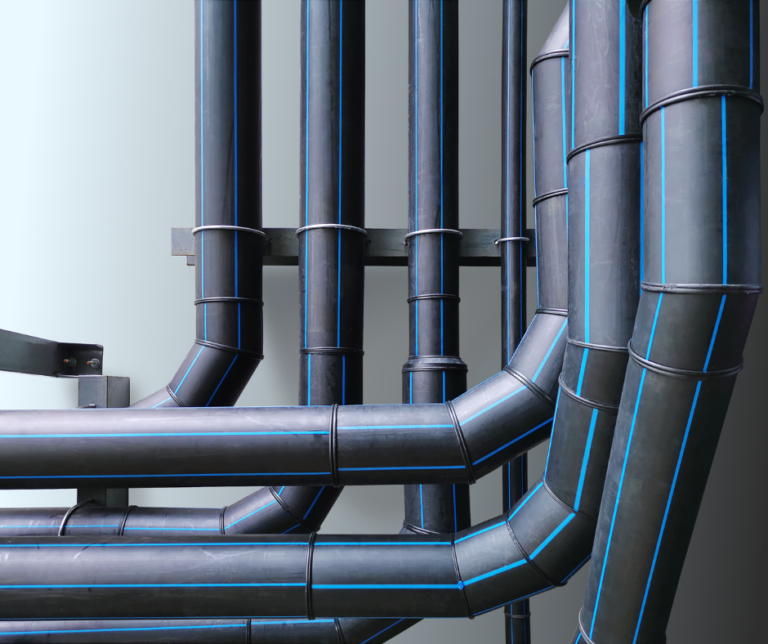Understanding the Key Advantages of HDPE Pipe for Water and Wastewater Administration
Making use of HDPE pipe in water and wastewater monitoring offers many advantages that merit factor to consider. Its outstanding durability and lengthy life expectancy make it a preferred selection for several jobs. Furthermore, the material's resistance to rust and chemical damage enhances its reliability in numerous settings. The benefits expand beyond simply long life and resistance. Texas hdpe pipe manufacturer. Discovering its cost-effectiveness and ecological influence discloses much more engaging reasons for its widespread fostering in modern framework
Exceptional Sturdiness and Longevity

HDPE pipe attracts attention for its outstanding sturdiness and long life, making it a favored option in water monitoring systems. Created from high-density polyethylene, these pipelines can endure substantial stress and tension, making certain reputable efficiency over time. Their robust nature permits them to sustain extreme ecological conditions, consisting of temperature variations and dirt motions, which can cause various other materials to fall short.
The life expectancy of HDPE pipes often goes beyond half a century, giving a cost-efficient solution for towns and markets alike. Furthermore, the product's light-weight properties simplify installment, reducing labor expenses and durations. This toughness reduces the demand for frequent fixings or substitutes, additionally boosting its financial charm.
In water management applications, the integrity of HDPE pipes suggests less interruptions and boosted service connection, making them essential to lasting facilities advancement. The mix of longevity and longevity solidifies HDPE's duty as a cornerstone in efficient water administration solutions.

Resistance to Deterioration and Chemical Damage
While many products catch corrosion and chemical damages over time, HDPE pipelines exhibit impressive resistance, making them optimal for various water monitoring applications. This resilience originates from the molecular structure of high-density polyethylene, which is naturally non-reactive and does not wear away like metals or break down from exposure to extreme chemicals. As a result, HDPE is extremely reliable in environments with hostile materials, such as wastewater systems that may have acids, bases, and organic solvents.
In addition, HDPE pipes can stand up to ecological elements such as dirt acidity and saline problems, further boosting their viability for varied applications (Pipe Supplier American Plastics Midland). Their capability to keep structural honesty gradually reduces the danger of leakages and failures, which is crucial in making certain the safety and security and dependability of water distribution and wastewater monitoring systems. The resistance to deterioration and chemical damage significantly adds to the overall efficiency and long life of HDPE piping solutions.
Cost-Effectiveness and Economic Benefits
When considering the financial implications of water management systems, the cost-effectiveness of HDPE pipes ends up being noticeable. These pipelines offer lower installation and upkeep costs contrasted to traditional products like steel or concrete. Their lightweight nature simplifies transportation and installation, resulting in decreased labor expenses. Additionally, HDPE pipes display a lengthy life-span, often going beyond half a century, which translates to fewer replacements and long-term savings.
Moreover, the resistance of HDPE to deterioration and chemical damage minimizes the need for Get More Information costly fixings and substitutes. The pipelines likewise support efficient water flow, reducing energy prices related to pumping systems. By mitigating leaks and water loss, HDPE pipelines add to considerable financial benefits for municipalities and sectors alike. Generally, the preliminary their website investment in HDPE piping can generate significant financial returns over the life expectancy of the water management system, making it a prudent selection for lasting framework development.
Ecological Sustainability and Lowered Impact

Convenience and Flexibility in Installment
As a result of their one-of-a-kind buildings, HDPE pipes use remarkable versatility and versatility in installation, making them ideal for a wide variety of applications. Their light-weight nature enables easier handling and transportation, reducing labor costs and setup time. HDPE pipelines can be curved and formed to fit numerous terrains and project requirements, which is especially useful in challenging settings.
Furthermore, their resistance to corrosion and chemical damages enables installation in varied setups without the demand for specialized protective coverings. The capacity to fuse joints produces a continual, leak-free system, enhancing the total integrity and integrity of the installation. HDPE's adaptability also suits ground motion, decreasing the threat of damages in locations susceptible to changing soil. In general, these features make HDPE pipelines not just versatile but additionally a recommended option for water and wastewater management systems.
Regularly Asked Inquiries
How Does HDPE Pipe Compare to PVC in Water Management Applications?
HDPE pipeline uses exceptional adaptability, resistance to rust, and resilience contrasted to PVC. Its lighter weight promotes much easier setup, while its lengthy lifespan lowers replacement costs, making HDPE a preferred option in water monitoring applications.
What Is the Lifespan of HDPE Water Lines Under Typical Conditions?
Under normal problems, HDPE pipelines can have a life-span varying from 50 to 100 years. Their resilience and resistance to corrosion add to their lasting performance in different applications, making them a reliable option for framework.
Are HDPE Piping Recyclable After Their Solution Life?
Yes, HDPE pipes are recyclable after their solution life. hdpe pipe in stock Midland TX. They can be processed and repurposed into new products, greatly lowering ecological influence and advertising sustainability within the sector, making them an environment-friendly option for piping options
What Is the Installation Process for HDPE Pipeline?
The installation process for HDPE pipelines includes site preparation, trenching, pipe combination or mechanical joining, backfilling, and pressure testing. Appropriate strategies assure a resilient and effective system for delivering water and wastewater properly.
Can HDPE Water Lines Be Used for Both Potable and Non-Potable Water Systems?
Yes, HDPE pipes can be used for both drinkable and non-potable water supply. Their convenience, durability, and resistance to deterioration make them suitable for different applications, find here ensuring safe and effective transportation of water in different contexts.